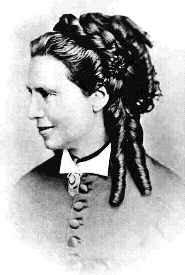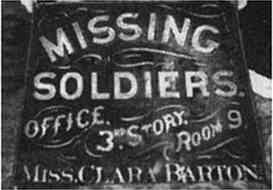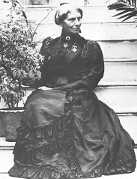|
|
|
 |
|
Clara BartonThe Angel of the Battlefield | |
|
"You must never so much think as whether you like it or not, whether
it is bearable or not; you must never think of anything except the need,
and how to meet it." |
 |
Much of her education came from her older siblings, and it must have seemed natural to Clara at age 15 to start a school at her father's mill and teach the worker's children. Over the next fifteen years, Clara taught in many schools throughout the Northeast. In 1851, some businessmen asked Clara to establish a school in
Bordentown, NJ. When enrollment at the school topped 600, the city
fathers decided they must hire a man as principal because it was too
much for a woman to handle. Clara quit in disgust, and shortly
thereafter suffered a nervous breakdown. She soon recovered and moved to
Washington, D.C., where she was hired as a recording clerk in the U.S.
Patent Office. Clara was the first woman hired by the Patent Office, and
she received the same salary as the men working there.
She traveled to the infamous Confederate prison at Andersonville to identify and mark the locations of buried soldiers. Nearly 13,000 graves were identified and the prison was transformed into a national cemetery. Clara had worked very hard during the Civil War and the years after, and her health was failing. In 1868, she suffered another nervous breakdown. Her doctor advised her to rest, so she went to Europe in 1869 for a vacation. While in Geneva, she was contacted by the International Red Cross, who wanted her assistance in persuading the United States to sign the Geneva Conventions of 1864, which among other things provided protection to those who cared for the sick and wounded during wartime. Clara was also asked to aid in the Franco-Prussian war. She distributed supplies and provided relief in war-torn areas of France and Germany and was awarded the Iron Cross by Kaiser Wilhelm. By the time she returned home, she was even more exhausted than she had been before her departure. She suffered a third nervous breakdown, and this time she temporarily lost her eyesight. By 1877 she was able to begin the fight to have the Geneva Conventions signed by the president and ratified by the Senate. She wrote articles, made speeches, and lobbied Congress. It was an uphill battle because of the Monroe Doctrine, which prohibited treaties and alliances with Europe. President James Garfield promised to sign it, but he died before he got the chance. In 1881, Clara created the American Red Cross. She organized a national office and local chapters in cities across the U.S. President Chester A. Arthur finally signed the Geneva Conventions in 1882, and the United States officially became a member of the International Red Cross.
She also stressed the importance of educating victims to look after themselves. This evolved into what became known as "First Aid" and the original first aid kits. She made first-aid training one of the core responsibilities of the Red Cross. Clara was 77 when she went to Havana, Cuba, at the start of the Spanish-American War to care for sick and wounded soldiers and provide relief to the civilian population. She worked 16-hour days delivering supplies by mule-wagon and providing medical care to soldiers living in camps rife with diseases such as dysentery, typhoid, malaria, and yellow fever.
Clara was outspoken and self-reliant. She refused any government funding for the American Red Cross because she didn't want to relinquish any control to government bureaucrats. She came under attack by many of her subordinates and other individuals over her authoritarian management style, and what they said was her mismanagement of Red Cross funds. Clara Barton resigned as president of the Red Cross in 1904, and was quite bitter about it, "The government I thought I loved and loyally tried to serve has shut every door in my face." She died of pneumonia at the age of 91 in 1912. Her home in Glen Echo, Maryland, is a National Historic Site. The American Red Cross currently has 8 regional centers, 1,000 local chapters, and 36 blood services regions that collect, process, and distribute blood and blood products to hospitals and medical centers. The American Red Cross supplies nearly 50 percent of the blood and blood products used in the U.S. Quite a legacy for a shy young girl from Massachusetts. |
|





